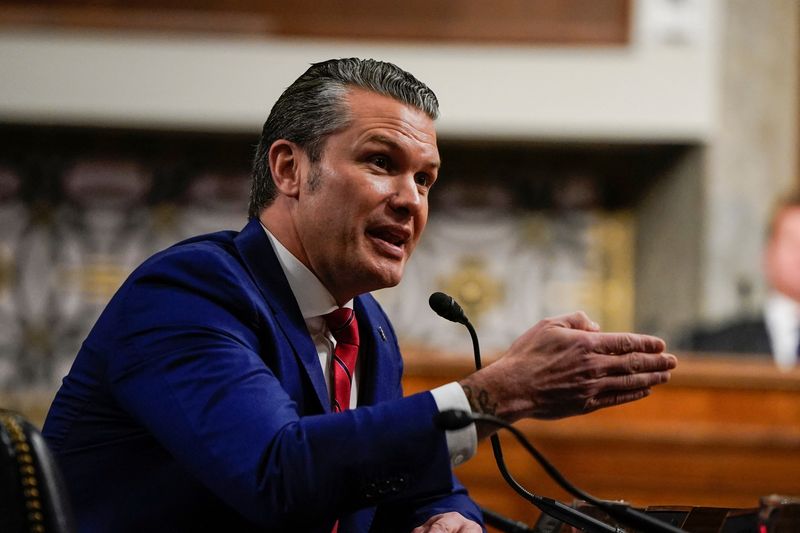By Phil Stewart and Idrees Ali
WASHINGTON (Reuters) - President Donald Trump's pick to lead the Pentagon, Pete Hegseth, has told lawmakers that he opposes the use of race as a factor when evaluating candidates for elite U.S. military academies, according to a document reviewed by Reuters.
Hegseth's remarks, which have not been previously reported and which are more explicit than those at his Jan. 14 confirmation hearing, suggest he could quickly move to strike down a policy designed to encourage diversity in the military's officer corps.
"I reject the idea that the MSAs (military service academies) should have different standards for individuals with different skin colors," Hegseth said in subsequent written responses to lawmakers.
Reuters reviewed a copy of Hegseth's replies to lawmakers about a host of questions, including his views on race-conscious admissions at U.S. military academies.
One of Trump's most divisive cabinet nominees, Hegseth could be confirmed by the Senate as soon as Friday.
Proponents of the existing policy have argued that a scarcity of minority officers could create distrust within the armed forces, which were racially segregated until 1948.
Still, the policy has faced intense scrutiny from allies of President Donald Trump who argue that factoring in race in admissions to colleges or job hiring and promotion is itself discriminatory.
Students for Fair Admissions, a group founded by affirmative action opponent Edward Blum, scored a major victory in 2023 at the Supreme Court, which barred policies used by colleges and universities for decades to increase the number of Black, Hispanic and other minority students on American campuses.
But while that ruling invalidated race-conscious admissions policies at colleges and universities, it explicitly did not affect military academies.
At the time, conservative Chief Justice John Roberts said those academies had "potentially distinct interests."
After that ruling, Blum's group filed lawsuits against the U.S. Naval Academy, the U.S. Air Force Academy and the Army's U.S. Military Academy at West Point, New York, seeking to eliminate the carve-out for military schools.
In a blow, a judge last month rejected Blum's arguments in his case against the Navy, writing that the race-conscious policy was narrowly tailored to rectify the "significant deficiency" in the number of people of color who are Navy and Marine officers. The other two cases are still pending.
Within hours of his inauguration on Monday, Trump issued a series of executive orders to dismantle diversity, equity and inclusion programs throughout the government, marking a reversal from his predecessor Democrat Joe Biden, who prioritized DEI initiatives across the federal government.
DEI programs attempt to promote opportunities for women, ethnic minorities, LGBTQ+ people and other traditionally underrepresented groups and to address longstanding inequities.
Trump and his supporters say DEI programs end up unfairly discriminating against other Americans and weaken the importance of candidates' merit in job hiring or promotion.
Hegseth, who has railed against such initiatives long before it became a rallying cry in the Republican Party, has pledged to rid them from the U.S. military along with critical race theory, or CRT, an academic concept which rests on the premise that racial bias is baked into U.S. institutions.

"Up front, you have to tear out DEI and CRT initiatives, root and branch, out of institutions," Hegseth said at his confirmation hearing.
The closest Hegseth came during the hearing to suggesting eliminating race as a consideration at the military academies was when he said "I only support hiring and promoting and admitting the best and brightest, whatever their background is."